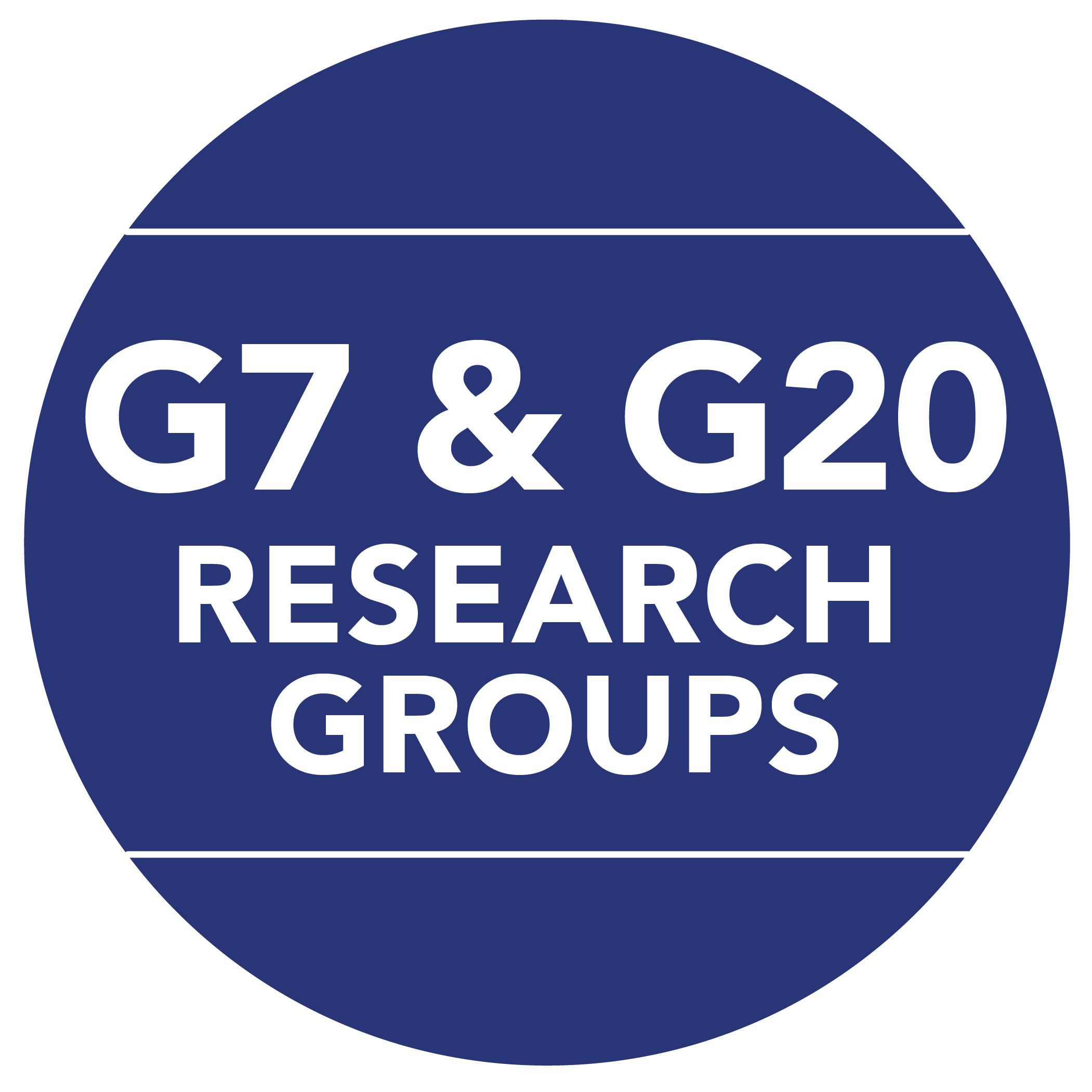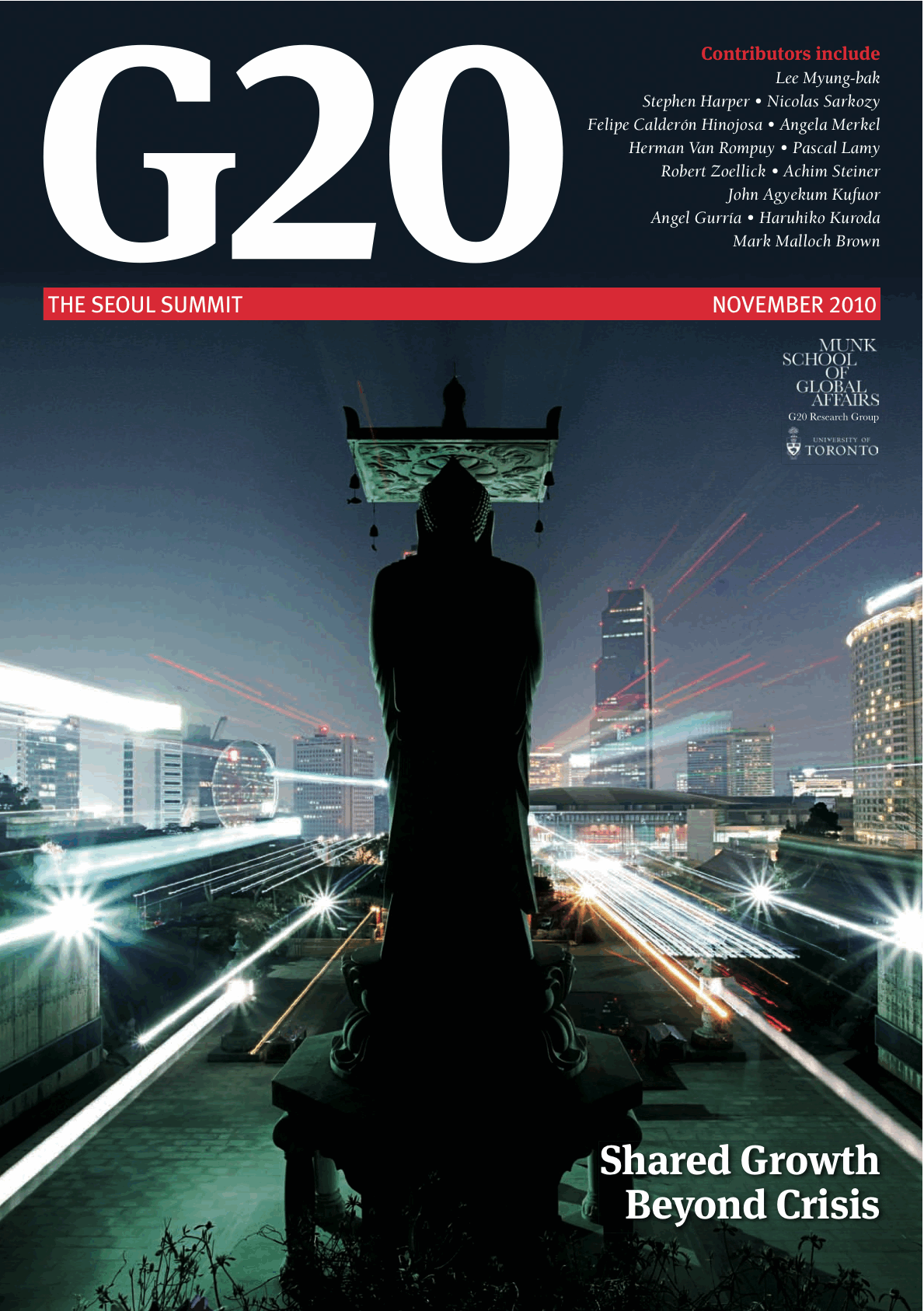

 |
 |
|

From Canada to Korea:
advancing global leadership through the G8 and G20
By Stephen Harper, prime minister, Canada
[Français]
Leaders at the G8 and G20 summits in Canada united on many global political, security and economic issues. The Seoul Summit needs to keep the momentum going and ensure that promises are kept, while future priorities are brought to the fore
To download a low-resolution pdf, click here. (Be patient! It's 50 MB.)
In June 2010, Canada had the honour of hosting two international summits back to back. G8 leaders met in Muskoka on 25-26 June, and G20 leaders met immediately after in Toronto, on 26-27 June. At these summits, I had the opportunity to engage in frank, focused discussions with other world leaders on some of the most important global challenges the world is facing today.
Under Canada’s G8 presidency, leaders renewed their focus on the most pressing development and peace and security challenges. The Muskoka Initiative on Maternal, Newborn and Child Health was the signature initiative of our summit. G8 members committed $5 billion in new and additional financing for the Muskoka Initiative until 2015. Members expect to mobilise significantly greater than $10 billion by 2015. For its part, Canada committed CA$1.1 billion in new money for the Muskoka Initiative and renewed existing funding of CA$1.75 billion over the next five years, for a total of CA$2.85 billion over five years.
Canada was also able to leverage these funding commitments to encourage support and further contributions from other governments, the private sector and international organisations. Indeed, the Muskoka Initiative was developed in close cooperation with the United Nations and the World Health Organization — the pre-eminent international organisations involved with the advancement of maternal and child health. Financial commitments were secured from a broad range of organisations, including several Organisation for Economic Co-operation and Development member donors and private foundations, such as the Bill and Melinda Gates Foundation. The Muskoka Initiative also made a key contribution to achieving the globally set Millennium Development Goals (MDGs) by building momentum toward the High-Level Plenary Meeting on the MDGs held in September 2010 in New York at the UN. This will make a difference in the lives of women and children in developing countries.
A hallmark of the Muskoka Initiative was a new commitment to accountability, a major priority of Canada’s G8 presidency. Donors and recipients alike, including the G8’s African partners, have committed to implement the Muskoka Initiative in a mutually accountable fashion. Our commitment will be tracked through an accountability mechanism. To this end, the G8 released the Muskoka Accountability Report: Assessing Action and Results against Development-Related Commitments. This is a landmark document that will help ensure the G8 lives up to the commitments it makes. It has set an important precedent for future summits.
G8 leaders spoke with a strong common voice on key security issues, such as nuclear proliferation and security vulnerabilities arising from terrorism, conflict and organised crime. We notably sent clear messages to Iran, urging it to comply with its international obligations regarding its nuclear programme. We condemned the 26 March attack that caused the sinking of the Korean naval vessel Cheonan and demanded that North Korea refrain from committing any attacks or threatening hostilities against the Republic of Korea. In addition, we discussed a number of other key situations, including Afghanistan.
The discussions that took place among G20 leaders in Toronto will help ensure that the group lives up to its relatively new role as the premier forum for our international economic cooperation. In Toronto, we agreed that the G20 Framework for Strong, Sustainable and Balanced Growth established in autumn 2009 is key to coordinating global economic cooperation. We identified specific measures to be undertaken over the medium term that will help put the global economy on a path to more sustainable growth. In this respect, a major success in Toronto was the adoption by leaders of targets put forward by Canada that will see advanced economies at least halve their deficits by 2013 and stabilise government ratios of debt to gross domestic product, or put them on a downward path by 2016.
In Toronto, progress was also made on the G20 financial sector reform agenda, which will help avoid a return to the excessive risk-taking that contributed to the recent crisis. In particular, leaders agreed that to strengthen financial regulatory frameworks, the amount and quality of capital held by banks must be significantly higher, and that new, stronger rules must be complemented by more effective oversight and supervision. Another key Toronto outcome relates to financial sector responsibility. While the G20 leaders agreed that the financial sector should make a fair and substantial contribution toward paying for burdens associated with government interventions, we also recognised that specific policy approaches will vary from country to country. In this respect, while some G20 members may choose to impose new taxes on financial institutions, most, like Canada, will not enact such measures.
The G20 has been leading a range of reforms that will improve the legitimacy, credibility and effectiveness of international financial institutions. In Toronto, the G20 was able to deliver on a number of earlier commitments, such as ensuring $350 billion in general capital increases for multilateral development banks, which will allow the banks to nearly double their lending in support of development. In Toronto we also endorsed recent reforms at the World Bank and called for an acceleration of efforts to advance additional quota and governance reforms at the International Monetary Fund (IMF).
In recognition of the role that international trade and investment play in supporting global recovery and sustainable growth, in Toronto G20 leaders agreed to renew for a further three years, until 2013, their commitment to refrain from imposing protectionist barriers to trade and investment. We also reiterated our support for bringing the Doha Development Round of negotiations at the World Trade Organization to a balanced and ambitious conclusion and committed to maintain momentum for Aid for Trade.
We made much progress on the global economic agenda in Toronto, but our work is far from complete. When G20 leaders meet in Seoul, Korea, on 11-12 November 2010, we need to maintain momentum on implementing the commitments made in Toronto and at past summits to ensure that there is no backsliding in the recovery of growth and jobs. This includes monitoring the Toronto commitments to rein in government deficit and debt, and building on the policy actions identified in Toronto under the G20 Framework for Strong, Sustainable and Balanced Growth so that in Seoul we can announce a comprehensive action plan to improve global growth and development prospects.
We also need to maintain the momentum on regulatory and financial sector reform. In particular, in Seoul we need to reach agreement on specific means to raise capital requirements for banks, improve financial sector supervision and address the problems associated with systemically important financial institutions. Regarding international financial institution reform, in Seoul G20 members should be ready to announce that they have fully ratified the 2008 IMF quota and voice reforms, completed the current quota reform and, in parallel, delivered on other governance reforms at the IMF as agreed in Toronto.
The Seoul Summit will also be important for setting forward priorities for the G20 beyond crisis management. In Toronto, G20 leaders agreed to undertake additional work on development and anti-corruption, and we established two new working groups on these issues. We look forward to reviewing their progress and proposals in Seoul.
Canada’s 2010 summits demonstrated that the G8 and G20 have distinct but complementary roles to play in addressing global development, peace and security, and economic challenges.
We can all be proud of the achievements made in Muskoka and Toronto, as we look forward to building on this work, in collaboration with G20 leaders in Korea this autumn and with my G8 and G20 counterparts next year in France.
|
This Information System is provided by the University of Toronto Library |
All contents copyright © 2024. University of Toronto unless otherwise stated. All rights reserved.